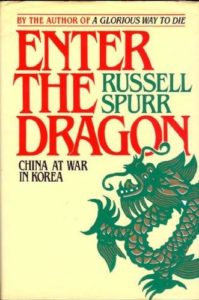
Russel Spurr was a British-Australian journalist who spent most of his life reporting from East Asia (20 years in Hong Kong), during which time he made many trips to China and Taiwan and interviewed multiple veterans of the Chinese intervention in Korea to write what was probably the first book covering the Korean war from the Chinese perspective (published in 1988). The book (Enter the Dragon. China’s undeclared war against the US in Korea 1950-51) provides a great introduction to the “other side” of the Korean conflict. Writing in journalistic style, he freely recreates conversations and scenes that obviously rely on accounts of survivors as well as his own imagination, but that does not mean he has not done his research. He knows his history and the bare facts are always accurate. And whatever the book lacks in typical military history details, it more than makes up in the form of vivid anecdotes that really bring the war to life.

Far too many Western accounts of the war portray the Chinese as some kind of undifferentiated mass of “Reds” who come across the mountains in human waves and overwhelm the Americans by sheer force of numbers, getting tens of thousands of their own robot soldiers killed in the process. This is very misleading, and the most valuable contribution of Spurr’s book is to put such caricatures to rest. The Chinese intervention in Korea was well planned and methodical. Lacking modern weapons and logistical support, the PLA nonetheless was an organized force, with high morale, great elan and some excellent leaders. Marshal Peng Dehuai had already made his mark in the Chinese civil war, and thanks to interviews with some of his staff officers, Spurr is able to provide a detailed picture of his leadership and initiative in Korea. Badly equipped and lacking all modern amenities, he (and the Chinese leadership in general) were still determined not to allow the Americans to conquer all of Korea. They knew their own weaknesses and compensated for them by using vast networks of coolies to carry supplies, by using captured supplies, by marching great distances on foot along mountain tracks to surprise the enemy, and by attacking at night to nullify America’s superior firepower and total domination of the air. They studied their opposite leaders and were well aware of MacArthur’s island hopping exploits in the second world war (when the North Koreans failed to break into the Pusan pocket, Chinese staff officers fully expected MacArthur to go for a bold amphibious landing, the only question was where).
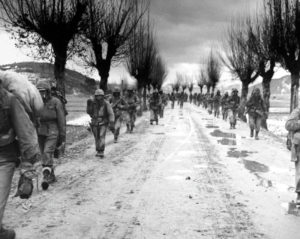
While they frequently had a cartoonish view of the GIs as uniformly soft and easily scared, their view of their American adversaries was much more realistic than the cartoonish view the Americans had of the “Chinese coolies”. In fact, the Chinese do seem to have tried to signal that total destruction of North Korea would not be allowed, and they hoped that the Americans would understand these signals. Unfortunately, the Americans (and in particular, MacArthur) were not mentally ready to see the Chinese as a respectable power with its own interests (somewhat understandable, given recent Chinese history), while the Chinese, for all their material backwardness, saw themselves as a great civilization, and were determined to be respected as one. The first phase of their counter-attack in Korea was well planned, brilliantly executed and led to the most humiliating retreat in US military history. These were not “meat-grinder” operations in which tens of thousands of Chinese died in human wave assaults, they were a series of well executed attacks that completely unbalanced the US forces and induced such defeatism that the US not only retreated from its positions near the Chinese borders, but did not even try to hold a line around Pyongyang (something they could have done, if they had been better led).
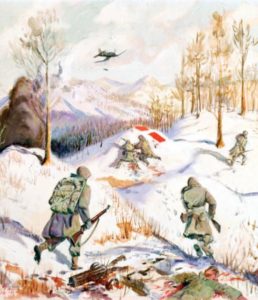 Ultimately, General Matthew Ridgeway arrived to take charge of the demoralized American troops and reversed their losses, retaking Seoul and fighting the Chinese to a standstill at the 38th parallel. In this phase, the Chinese did suffer horrendous casualties (and North Korea was bombed into the stone age), but by then Marshal Peng and his troops had made their point: Chinese core interests (as defined by the Chinese) would be defended, no matter what the cost.
Ultimately, General Matthew Ridgeway arrived to take charge of the demoralized American troops and reversed their losses, retaking Seoul and fighting the Chinese to a standstill at the 38th parallel. In this phase, the Chinese did suffer horrendous casualties (and North Korea was bombed into the stone age), but by then Marshal Peng and his troops had made their point: Chinese core interests (as defined by the Chinese) would be defended, no matter what the cost.
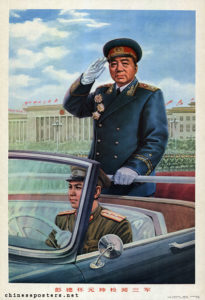
The book is full of fascinating anecdotes, but the one that will forever stay in my mind is of Colonel Wong passing through the frozen wastes of North Korea at the height of winter and being surprised by the site of dozens and then hundreds of snowmen scattered across the land; until his North Korean driver tells him that these are Chinese coolies and soldiers who froze to death in the arctic cold and have been covered by snow. The other is his description of the last days of the great Marshal Peng Dehuai. Marshal Peng, a straight shooting peasant revolutionary, made the fatal mistake of questioning Mao’s actions during the Great Leap Forward. For this, he was removed from his posts, arrested and then repeatedly beaten in the course of 130 brutal interrogations until he died under torture after many years of imprisonment.
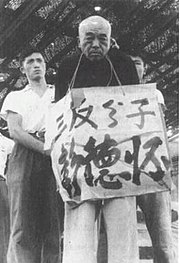
The other notable point in the book is that even when completely down and out, and certainly as soon as they were even a little bit back on their feet, the North Koreans deferred to no one. Even though it was the Chinese who were doing almost all the fighting at that point, the North Koreans insisted on maintaining appearances (the Chinese as their guests, the North Koreans as the primary actors in the war) and today the gigantic Korean war museum in Pyongyang has only one picture showing Chinese volunteers crossing the Yalu, everything else is Korean.
Spurr has the war correspondents disdain for the senior brass of his own army and has a special dislike for MacArthur, so he may be a little unfair when it comes to the supreme commander, but overall this is a fair and balanced book and one that fills a real gap in histories of the Korean war. In a way, Spurr was lucky he got into China to research this when the Chinese were repudiating the Cultural revolution and Maoism and his interlocutors were able to talk to him relatively freely. That degree of openness may not be possible now. It is possible that other researchers have dug up material that was not available to Spurr when he wrote this book in the 1980s, but I am not aware of another (English language) book that presents the Chinese side in this manner. Definitely worth reading.

Fascinating ! I’ve only thought of China’s entry into the Korean war through the Taiwan angle before.
It is interesting how China went from being mostly resigned to a futile resistance to Japanese domination in the late 30s, to beating back the US military in Korea in the early 50s. If the Japanese imperial project didn’t get caught up the larger 2nd world war, wouldn’t Manchukuo still have existed? What made a China which allowed a Manchukuo so close to their hearland stand up to Korea as US client? Would you credit this confidence to Mao’s sense of Soviet backing or did he actually believe his own Paper tiger rhetoric? Did the ongoing Taiwan crisis and a sense of mortal siege have a role? The Chinese troops obviously went on to prove the gamble of entering the Korean war right, but I’m thinking of how it might have looked to Chinese planners before their entry.
In addition, to be somewhat simplistic, I would also draw a straight line from the PLA performance in Korean war to the respect that won them the Nixon normalization in the 70s and then onwards to their miraculous national resurgence since ☺️